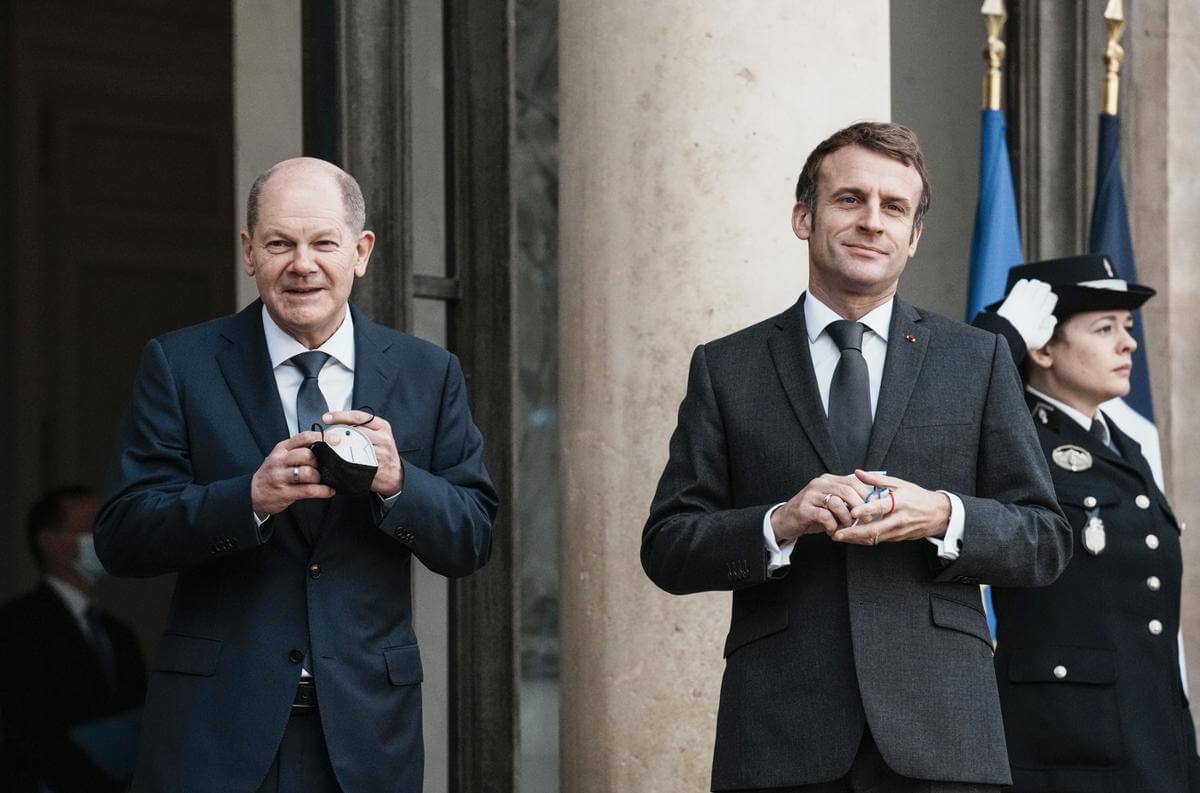During their telephonic conversations with Vladimir Putin on Thursday, French President Emmanuel Macron and German Chancellor Olaf Scholz urged the Russian leader to agree to an immediate ceasefire and emphasised on continuing negotiations to settle the Ukraine war.
🇷🇺🇩🇪🇫🇷📞 Am 10. März 2022 telefonierte Wladimir #Putin mit Bundeskanzler Olaf #Scholz und dem französischen Präsidenten Emmanuel #Macron.
— Botschaft der Russischen Föderation (@RusBotschaft) March 10, 2022
Sie erörterten weiter die Situation um die #Ukraine.#Russland #Deutschland #Frankreich pic.twitter.com/bi5aEjdLXo
According to the official press release from the Kremlin, the leaders discussed developments around the “special military operations to protect Donbas” and the third round of negotiations between the Russian and Ukrainian delegations.
Macron and Scholz have just held a joint phone call with Putin, ahead of the EU informal summit today in Versailles. They demanded a ceasefire from Russia, and a negotiated solution to the crisis (source: Elysée)
— Sophie Pedder (@PedderSophie) March 10, 2022
Additionally, the leaders discussed the humanitarian situation in what the Kremlin referred to as the “Republic of Donbas.” “The President of Russia spoke about measures to organise humanitarian corridors for the evacuation of civilians from areas of clashes and attempts by militants of nationalist groups to prevent the safe evacuation of people,” Russia’s statement said. Furthermore, the leaders agreed to maintain contact at various levels.
According to Russian state-owned news agency TASS, Scholz expressed his willingness to hold further negotiations to settle the Ukraine conflict. Upon arriving at a meeting with European Union (EU) leaders in France, Scholz said, “I actively discuss it with others: regularly with President [of Ukraine] Zelensky, but also, of course, with the Russian president, including with my French counterpart. This is very important.”
Macron says he, @OlafScholz will speak again with Putin in 48 hours to push ceasefire, diplomatic off-ramp. Scholz/Macron spoke to Putin earlier today. But @EmmanuelMacron says he is "worried, pessimistic" about #Ukraine situation. "Europe must prepare itself for all scenarios."
— laurence norman (@laurnorman) March 10, 2022
“It’s also important that at this summit it’s especially obvious that Europe is united, that the EU acts in unison,” Scholz added. However, he declined to comment on reports of former German Chancellor Gerhard Schröder’s presence in Moscow to mediate a settlement for ending the Ukraine war. Schröder reportedly holds high-level positions in Russian state-owned energy companies, and is a director in Gazprom and a chairman in Rosneft. He is reportedly currently in Moscow in order to mediate the conflict, possibly at the suggestion of Ukraine.
Since Russia launched a “special military operation” in Ukraine on February 24, the Russian and Ukrainian officials have held four rounds of negotiations to discuss the crisis, but have failed to reach a solution. On Thursday, the foreign ministers of Russia and Ukraine met in Turkey for the first time following international condemnation against Moscow for targeting a children’s hospital in Mariupol. After the meeting, Ukrainian Minister of Foreign Affairs Dmytro Kuleba said no progress was made due to Russia’s insistence on Ukraine surrendering.
Both leaders continue to maintain close communication with Putin, especially Macron. Reportedly, Macron and Putin have spoken to each other 11 times in the last month. Macron also visited Moscow last month to convince Putin to de-escalate and withdraw troops from the Ukraine border. A few days after Macron’s visit, Putin declared Luhansk and Donetsk as independent republics and launched a full-scale invasion of Ukraine. Furthermore, on March 3, Putin organised a call with Macron to inform the French President of his military operations in Ukraine. Following the call, Macron warned the international community that the “worst is yet to come in Ukraine.” The leaders spoke again on March 6, after which Putin said he would organise a humanitarian corridor for civilians trying to flee the war, a promise Russia has yet to make true on.
Macron is aware of the optics of speaking to Putin repeatedly at a time when the Russian leader has been isolated by the Western bloc. However, France is keeping all lines of communication open in order to explore all possible options for de-escalation.
That being said, a former aide of the French leader has claimed that Macron is “obsessed” with Putin and that he has previously sought to establish Russia as “an alternative to China.” In fact, in 2019, Macron described Russia as a “profoundly European nation.”
Nevertheless, the Macron administration has also supported strict sanctions on Russia, including excluding Russian banks from the SWIFT international financial transaction system and targetting oligarchs close to Putin. Yet, despite his frequent calls with Putin, it appears that Macron has little to no influence on his behaviour.

